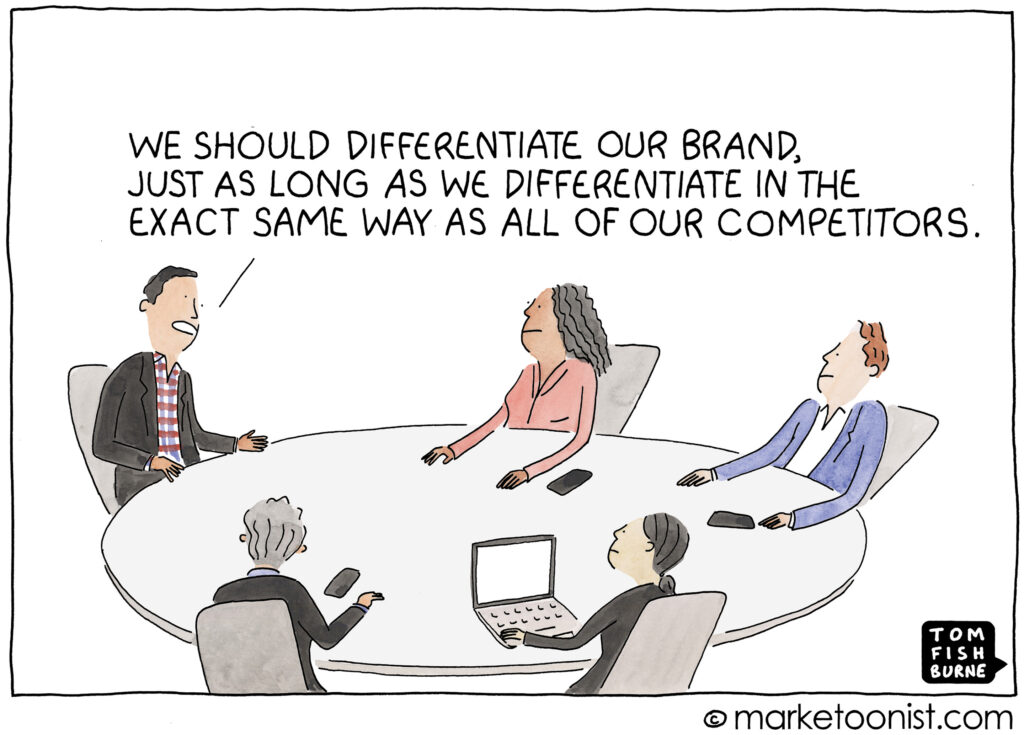For context, branded keywords appear when a customer types the name of your company when searching—they are already familiar with you and trying to find you online.
Unbranded keywords are generic searches like “car repair” or “plumbing services”—in these types of searches the customer typically has no clear preference for the provider, no one brand specifically comes to mind, and customers are generally ambivalent.
Which one performed better?
The branded keyword campaign obliterated the unbranded keyword campaign—in dollar terms, the branded campaign returned a total of $121,498 in gross profit after ad spend while the unbranded campaign lost a total of $31,946.
The verdict here is simple—better to be known than unknown in the eyes of consumers.
In the digital marketing system, everyone is chasing ambivalent audiences and trying to persuade them with clever and witty copywriting to “win” them over and buy trust.
The real world doesn’t work that way.
And it’s why 90% of today’s marketing dollars are a total, utter, and shameful waste of time, energy, and precious resources.
The marketing buzzards will fight this all day long with “metric wizardry” and “impression fools’ speech,” but you know better.
Since everyone is basically chasing the SAME audience with the SAME buzzy messaging, nobody is paying attention.
They’re sailing in a sea of sameness – where all the fish bait looks exactly the same and no fish take the bait.
No fish, no business.
Yes, the marketing world is a fishy business after all.
The NOW economy
Les Binet, Head of Effectiveness DDB UK, globally recognized expert in econometrics and all things marketing, may have summarized it best:
“If you build your business, or try to build your business, using short-term efficiency measures—cost per response, click-through rates, that kind of thing…you’re going to run your business into the ground. We believe because those are not the things that grow the business, long term…so if you want really disproportionately large marketing effects, if you want big sales and big profits, aim for fame.”
Successful brands have elements of fame. Some brands are even famous.
But building brands is not what marketing “experts” preach today—there is no job security in brand-building if you’re in the marketing business.
Because today’s marketing is all about the NOW and instant gratification.
There is no time for brand-building when you’re too busy trying to convince the ambivalent masses to care about you when they never will.
Marketing utopia is when your brand is sought out in the market, and you don’t have to spend (and waste) a fortune trying to be found.
Strategic marketers know the power of being sought, tactical marketing buzzards are stuck in the endless “pick me” pursuit loop.
The money players in this game (Google, Facebook to name a few) have brilliantly gamified the new advertising systems so you are dopamine incentivized to chase the ambivalent masses.
The marketing buzzards who deliver zero ROI and results are left serving up useless piles of digital marketing metrics they know will appease their clients and keep the game going as long as it can.
Admittedly, I’m an old-school marketing purist—that is, I like to do the hard work and play the long game. And I don’t like rules, especially the ones in marketing handed down by marketing buzzards who never learned how to play their marketing instruments.
So here we are, meandering marketing fools sailing the sea of sameness, looking to differentiate our fishhooks to attract more fish, only to be left dazed and confused about why the fish are not biting.
Distinction vs. Differentiation
Marketing pundits love to play intellectual tennis when debating the “rules” of marketing effectiveness so let us jump into the fray, shall we?
This battle pits differentiation versus distinction.
For what seems like marketing eternity, differentiation has been the most recommended “rule” in marketing, but perhaps there is a variation or mutation here that will serve brands better in the long haul…
…brand distinction.
Brand differentiation is different from brand distinction.
And differentiation doesn’t alone create distinction.
People don’t debate the ingredients inside competing toothpaste brands…
…to them, all toothpaste brands do the exact same thing…
…provide oral hygiene, prevent cavities, and protect your teeth and gums.
But all toothpaste brands will try in vain to create meaningful differentiation in the consumer’s mind, a difficult and maybe impossible task.
This is where distinctiveness plays a major role in winning the all-mighty share of consumer mind—winning brands create a distinction, even if meaningless, with the consumer.
Brands that are “sought” out in the market have created “distinction.”
And if it turns out your brand is “sought,” “distinct” and “different,” – checkmate!
Stay unruly ~
